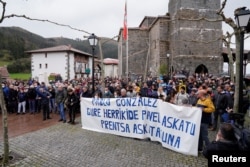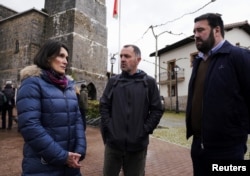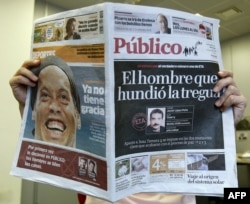Pablo González is a Spanish journalist also known by his Russian name, Pavel Rubtsov.
His Spanish-Russian citizenship might explain the reason for his current whereabouts: a Polish prison cell on accusations of spying for Russian intelligence. If convicted, he could serve up to 10 years in jail.
Poland's secret services claim he used his role as a journalist as a cover, but they have not publicly released any evidence to support that claim.
González will deny the charges, said his lawyer, Gonzalo Boye, who insists his client is simply a freelance reporter. Though González has family links to Russia, Boye said that does not mean he is a part of Vladimir Putin's secret service.
Polish authorities arrested the journalist on February 28. On that day, he was due to cross the border into Ukraine with a group of reporters.
González will be held for at least three months in a prison about 400 kilometers from Warsaw, the lawyer added.
Family roots
His wife, 36-year-old Oihana Goiriena, laughed off claims that the man she has been married to for 16 years was a spy.
So, who is the real Pablo González?
His wife and a friend say his Russian roots come from his late grandfather, Andrés González, who was a child when his family fled from Spain to Russia during the Spanish Civil War to escape General Francisco Franco's forces.
González, 39, lived in Moscow until he was 9 years old when his parents divorced and he moved with his mother to Spain. He speaks fluent Russian and undertook Slavic studies at the University of Barcelona. His Russian name is taken from his father, who still resides in Moscow.
As a journalist, González specializes in covering conflicts in eastern Europe, including Ukraine and Nagorno-Karabakh, often looking at the toll of fighting on those living in affected regions. He has freelanced for Voice of America, Público, the Basque nationalist newspaper Gara and the Spanish TV channel laSexta. He also works as a political commentator.
When he is not traveling as a war correspondent, he is a family man who lives with his wife and their three sons in the quiet town of Nabarniz in the Basque region of northern Spain. He has a passion for the Athletic Bilbao football club, said Gabriel Ezkurd, a friend of 15 years.
According to the Polish secret services, the reality is very different.
Asked about González by VOA, Poland's Internal Security Agency shared a statement saying, "The man was identified as an agent of the Main Intelligence Directorate of the General Staff of the Russian Federation (GRU). He carried out activities for Russia using his journalistic status. As a result, he was able to move freely around Europe and the world, including zones affected by armed conflicts and areas of political tension."
Authorities said that during his time in Poland, González "obtained information the use of which by the Russian secret services could have a direct negative impact on the internal and external security and defense of our country."
González was about to travel to Ukraine allegedly to "continue his activities," the statement added.
The Polish security services did not provide details about these purported activities.
Attila Mong, Europe representative at the Committee to Protect Journalists, says his organization is closely monitoring the case.
"In conflict situations, authorities often use spying allegations as a way to deter journalists from reporting," he said.
And Poland has been criticized previously by the EU and rights groups over its media freedom record.
"Legal threats and smear campaigns are a daily menace to outspoken journalists, and journalists covering the migration crisis on the Belarusian border have been detained and harassed," Mong told VOA.
In the case of González, CPJ is focused on ensuring the journalist is granted a fair and transparent legal process to "ensure he is not sanctioned for his journalistic activities. Reporting is not a crime," Mong said.
'Surrealist film'
Goiriena, a council administrator, said the last time she spoke to her husband was in a hurried telephone call he made from a Polish jail after his arrest.
"He just rang to say he was accused of espionage. He said to call the lawyer, tell his mother. I could not believe it. It has all been like a bad surrealist film," she told VOA.
This was not the first time González has appeared on the radar of security services.
On February 5, he was summoned to Kyiv for questioning and was quizzed for three hours by Ukraine's secret service before being released, according to his lawyer.
At the time, he was reporting in the Donbas area for Spanish newspapers and TV. After his release, he returned to Spain, Boye said.
The International Federation of Journalists reported that González was accused of being pro-Russian in his coverage for a Spanish newspaper.
Three days later, on February 8, Goiriena was informed of González's arrest in Ukraine when eight officers from the Center for National Intelligence, the Spanish secret service, knocked on her door.
"These officers arrived at our house and told me he had been accused of spying. They were very disparaging about Pablo, saying his work as a journalist was a lie to cover his real work as a spy. I was trembling," Goiriena told VOA.
"He is totally innocent. I have been married to him for 16 years and know him better than anyone, than his mother," she said.
González also dismissed the accusation in a message sent to friends after being questioned in Ukraine.
"I don't know what they are going to invent. Tell me what secrets? Who I've spoken to? It's ridiculous," he said in a message published Wednesday in the left-wing Spanish newspaper Público.
On Monday, a Spanish consular officer in Warsaw visited González in prison.
"I was contacted by the consul, who said Pablo was well and in good spirits but frustrated that he was accused of spying," Goiriena said.
González's lawyer, Boye, has not been allowed to see his client.
"Pablo will deny the charges. Just because he is a journalist who comes from Russia, it does not mean he is a spy," Boye told VOA.
Friends and colleagues are not convinced by Poland's claims.
Virginia Alonso, director of Público, told VOA, "I don't know whether he is a spy or not, but I think this was a misunderstanding because of his Russian roots and the fact he works for left-wing papers like Público. If he worked for El País, this probably would not have happened," she said, referring to the center-left Spanish newspaper.
Ezkurd told VOA that González "has been criticized (over the years) by many groups from the (political) left for being critical of Putin. He has not had a pro-Russian position. I can't believe he is a spy, and I have known him a long time."
VOA's review of González's Twitter feed reveals a series of comments about the Ukraine crisis but no support for Russia's military action.
A spokesperson for Spain's Foreign Ministry, who declined to be named in line with policy, said: "We have afforded consular assistance to Mr. González."
Spain's Defense Ministry, which has responsibility for the intelligence agency, declined to comment.
A statement released by VOA said, "González is a freelance journalist based in Europe who has provided content to a number of media outlets, including VOA. González ultimately appears to have submitted six stories to VOA from October 2020 to July 2021. He also provided some camera operator work last month in Ukraine."
The statement added that "out of an abundance of caution," the network has removed his content and is reviewing it and has informed the VOA/USAGM security office of the arrest.







